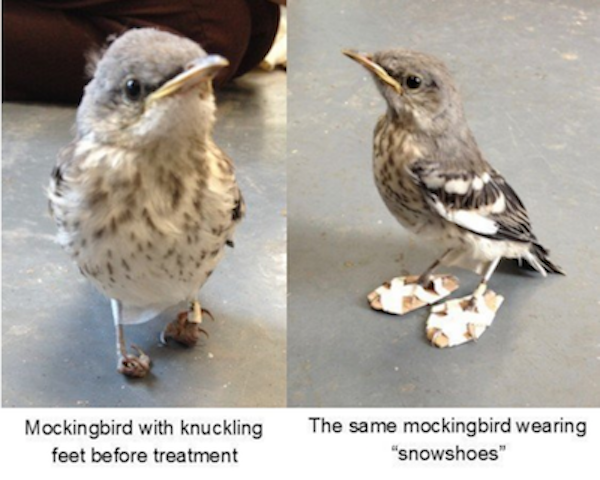
Click here to listen to this week’s episode of The Mockingcast, which features an interview with Kenneth Woodward, the former religion editor at Newsweek and recent author of Getting Religion: Faith, Culture, and Politics from the Age of Eisenhower to the Era of Obama.
1. First off, The Huffington Post was kind enough to alert us of our new mascot: Injured Mockingbird Given Pair Of Wee ‘Snowshoes’ To Heal Its Feet. Just wonderful, ht SB.

2. Really interesting article in The Atlantic asking why people hate poetry. The answers they come up with–via Ben Lerner’s new book The Hatred of Poetry–are not what you might expect. The moment that poetry became a synonym for, well, grace, it doomed the medium. Meaning, you can refer to a something a loved one does as “poetry” but not as “prose”. No matter how good they are, poems themselves can only ever evoke some small aspect of ‘poetry’. They can’t help but fail their namesake–and no one likes failure. Once again, we have the Romantics to blame:
The Romantics, faced with a disenchanted universe, attempted to discover a new source of enchantment in the human imagination, and poetry became a metaphor for that creative, life-enhancing power. Poetry used to mean poems. Now poems began to seem like just one habitation, and far from the grandest, of the force that is poetry…
“Most of us carry at least a weak sense of a correlation between poetry and human possibility,” he asserts. Thus, “if I have no interest in poetry or if I feel repelled by actual poems, either I am failing the social or the social is failing me.” This feeling of failure is what explains why people tend to hate poetry, rather than simply being indifferent to it. Poetry is the site and source of disappointed hope.
“ ‘Poetry’ is a word for a kind of value no particular poem can realize: the value of persons, the value of a human activity beyond the labor/leisure divide, a value before or beyond price,”… [Lerner] draws attention to the inevitable gap between the actual poem, which can only be a series of particular words, and what he calls the “virtual poem”, which we can imagine as being perfect because it remains pure potential.
On the Mockingcast this week Sarah made a shrewd comment about how similarly people talk about poetry and church. That is, as something heartfelt but misguided you did in a past life (high school) for which you have to apologize, maybe a bit wistfully. In both cases, the tone says more the person speaking than their subject. One wonders if a more grown-up view of poetry–and church–might allow it to serve less as a channel for lofty idealism than as a refuge from it. Sigh.
3. Case in point, if there is such a thing as a delightful obituary, it is the one The Economist ran for clown-priest Roly Bain, under the suitable title “Let Us Play!”. Favorite line is probably when the writer notes that, “it was all very un-Anglican”. Ha, ht CB:
[Roly had] had enough of top-heavy pomposity at theological college, when some of his fellow students seemed fixated on high preferment and glittering robes, and he, instead, had preached on Jesus as a clown. A clown was a truth-teller, living by different rules—as he did when, on ten occasions, he greeted a presiding bishop with a merry splat of custard pie…
He also dared, like all clowns, to expose his vulnerability publicly and completely. This put him in a long tradition of holy fools… Like all these, he opened himself up to ridicule, giving only innocence, love and joy in return.
When he clowned around, hiding his skill at pratfalls and slapstick behind wide-eyed alarm, his audience seemed to open up to God, releasing pent-up emotions and becoming like children in faith, hope and love…
4. In the profundity and perspective department, I won’t debase Victor Lee Austin’s musing on “The God Who Took Away My Wife” in the Wall Street Journal by trying to excerpt it here, except to say that it’s a rare day when a national news outlet runs a line like, “There is no darkness into which a human being can descend that Jesus has not already descended.” Amen.
5. In humor (of the true-story variety), a man was arrested for speeding in DeLorean at 88mph. Elsewhere, The Onion reported that “Third Stepdad In Row Has Goatee”. Babylon Bee gave us “Drama Still Tragically Following Local Woman Who Just Hates Drama”. Also, this:
6. Social Science Study of the Week: The Guardian reports that “Teenagers more likely to eat healthily if they think it is rebellious”.
7. The Atlantic ran a long piece from Nir Eyal about Q-Tip addiction, and the responsibility (or not) that companies have for how their products are used. Eyal’s description of “The Q-Tip Effect” has some eerie resonance with, well, you know:
Addictive products always provide the brain with a temporary fix—but the solution creates more of the problem. Repeatedly rooting out the ear canal dries out the skin and can scratch the eardrum, causing inflammation. Inflammation feels a lot like the blockage that incited the ear prodding in the first place. The more you prod, the worse the itch becomes, and the more you scratch. The cycle continues until medical attention is needed.
I call it the Q-tip Effect: when a perceived solution becomes the source of the problem. Problem gambling leads to financial stress, increasing the allure of escaping into a mindless zone state where the weight of the gambler’s troubles can’t be felt. The social isolation and guilt that comes with opiate abuse makes the warm, love-like embrace of a heroin high even more desirable.
8. In music, any week that Meat Loaf and Jim Steinman release a fresh collaboration is a week worth celebrating. The title of the opening single captures their outlandish appeal perfectly, “Going All the Way Is Just the Start” (bottom), though poor Meat’s voice sounds like it’s been through the, er, grinder. It’s also nice to have a new Dawes record in the world. We see you, Nate Michaux. But my jaw hit the floor earlier this week when someone sent me Mike Scott of The Waterboys’ glorious, JC’d-out one way love anthem, “Love Anyway”, released (as you can hear) just as Britpop was cresting, ptL. Sing it loud and sing it proud, ht CM:
Strays
- Potential field trip this Spring in NYC (earlybird pre-registration for which opened this week!) has got to be the new NYC cinema Metrograph that GQ highlighted via the interview director-hero Wes Anderson conducted with the brains behind the joint, Alexander Olch. Scattered throughout are some wonderful tidbits about film, ht CB.
- Also on the film front, finally a confrontational headline from Slate we can all get on board with: “Everyone Misunderstood Brad Bird’s The Iron Giant: It’s Not About Guns. It’s About Sin.” Amen.
- Despite its disturbingly non-gracious premise, The Good Place is getting good reviews.
- The Mental Health Issue of The Mockingbird is officially out of our hands. We’re hoping for a shipping date of 9/22 and will keep you posted.
- Click here to view the e-newsletter we sent out earlier today. And here to be sure you’re on our mailing list.
- Finally, the Dr. Who clip we mention on the Mockingcast is this one:
https://www.youtube.com/watch?v=hgMv9QOcmNw

COMMENTS
One response to “Another Week Ends: Knuckled Mascots, Poetry Haters, Holy Fools, Healthy Teenagers, Q-Tip Effects, and Beloved Waterboys”
Leave a Reply













Interesting piece on The Iron Giant. Let’s accept the author’s take that the story is about sin. I hadn’t thought of it that way before, but he’s right, though not in the way he supposes.
The Giant has a soul, and in Brad Bird’s telling, this means he has a choice–“free will.” So it is put to him to choose good and evil, which he did not know before, and it is told to him that he will be whatever he chooses. Like God, one might say. That is as clear an identification of sin as one is likely to find. So in this little re-telling of Genesis 3, the Giant is Eve (or Adam–take your pick), and Hogarth is the serpent. I knew I didn’t like that kid.